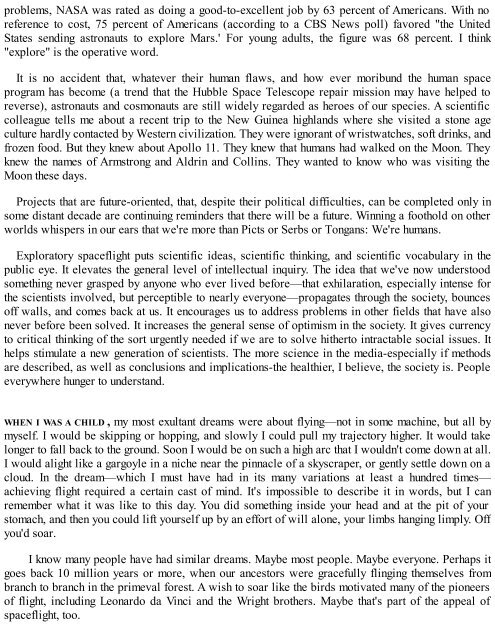Pale Blue Dot ( PDFDrive.com ) (1)
Create successful ePaper yourself
Turn your PDF publications into a flip-book with our unique Google optimized e-Paper software.
problems, NASA was rated as doing a good-to-excellent job by 63 percent of Americans. With no<br />
reference to cost, 75 percent of Americans (according to a CBS News poll) favored "the United<br />
States sending astronauts to explore Mars.' For young adults, the figure was 68 percent. I think<br />
"explore" is the operative word.<br />
It is no accident that, whatever their human flaws, and how ever moribund the human space<br />
program has be<strong>com</strong>e (a trend that the Hubble Space Telescope repair mission may have helped to<br />
reverse), astronauts and cosmonauts are still widely regarded as heroes of our species. A scientific<br />
colleague tells me about a recent trip to the New Guinea highlands where she visited a stone age<br />
culture hardly contacted by Western civilization. They were ignorant of wristwatches, soft drinks, and<br />
frozen food. But they knew about Apollo 11. They knew that humans had walked on the Moon. They<br />
knew the names of Armstrong and Aldrin and Collins. They wanted to know who was visiting the<br />
Moon these days.<br />
Projects that are future-oriented, that, despite their political difficulties, can be <strong>com</strong>pleted only in<br />
some distant decade are continuing reminders that there will be a future. Winning a foothold on other<br />
worlds whispers in our ears that we're more than Picts or Serbs or Tongans: We're humans.<br />
Exploratory spaceflight puts scientific ideas, scientific thinking, and scientific vocabulary in the<br />
public eye. It elevates the general level of intellectual inquiry. The idea that we've now understood<br />
something never grasped by anyone who ever lived before—that exhilaration, especially intense for<br />
the scientists involved, but perceptible to nearly everyone—propagates through the society, bounces<br />
off walls, and <strong>com</strong>es back at us. It encourages us to address problems in other fields that have also<br />
never before been solved. It increases the general sense of optimism in the society. It gives currency<br />
to critical thinking of the sort urgently needed if we are to solve hitherto intractable social issues. It<br />
helps stimulate a new generation of scientists. The more science in the media-especially if methods<br />
are described, as well as conclusions and implications-the healthier, I believe, the society is. People<br />
everywhere hunger to understand.<br />
WHEN I WAS A CHILD , my most exultant dreams were about flying—not in some machine, but all by<br />
myself. I would be skipping or hopping, and slowly I could pull my trajectory higher. It would take<br />
longer to fall back to the ground. Soon I would be on such a high arc that I wouldn't <strong>com</strong>e down at all.<br />
I would alight like a gargoyle in a niche near the pinnacle of a skyscraper, or gently settle down on a<br />
cloud. In the dream—which I must have had in its many variations at least a hundred times—<br />
achieving flight required a certain cast of mind. It's impossible to describe it in words, but I can<br />
remember what it was like to this day. You did something inside your head and at the pit of your<br />
stomach, and then you could lift yourself up by an effort of will alone, your limbs hanging limply. Off<br />
you'd soar.<br />
I know many people have had similar dreams. Maybe most people. Maybe everyone. Perhaps it<br />
goes back 10 million years or more, when our ancestors were gracefully flinging themselves from<br />
branch to branch in the primeval forest. A wish to soar like the birds motivated many of the pioneers<br />
of flight, including Leonardo da Vinci and the Wright brothers. Maybe that's part of the appeal of<br />
spaceflight, too.


